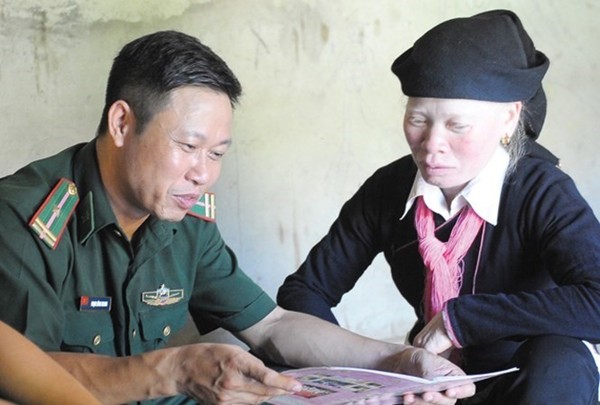 Storm Mulan heads toward northern coast
Storm Mulan heads toward northern coast
Home > Socio – Culture
Soldiers in fight to eradicate illiteracy
By VNA 12/27/2017 15:30 |

Major Phạm Công Khanh (left) teaches letters to Phàn Thị Hằng, a Dao ethnic minority woman in Lào Cai Province. — Photo tienphong.vn
LÀO CAI — In the middle of a forest in the northern mountainous province of Lào Cai, classes teaching reading and writing for under-50-year-olds have been held in the evenings for the past two years.
Soldiers at Bát Xát Border Post teach the class in San Bàng Village, Bản Vược Commune in Bát Xát District.
Most of the students are illiterate local women, many of whom are grandparents learning to read and write for the first time.
Phàn Thị Hằng, 42, a Dao ethnic minority woman, is one of the youngest students of the class.
She carries her baby on the back to the class.
Unable to hide her happiness, Hằng shows her old notebook full of spelling mistakes when she started writing and describes her studying journey.
Hằng is short-sighted and her family is poor, so as a child she didn’t go to school.
Because of being illiterate, Hằng did not dare to travel as she was afraid of losing her way and she could only sign documents by pressing her finger-print on them.
“When I first joined the class, I intended to quit because it was so difficult. Holding pen was more difficult than holding a plough,” said Hằng.
Then major Phạm Công Khanh, one of teachers, went to Hằng’s house to encourage her, giving Hằng the determination to go to class.
“Teacher Khanh wholeheartedly helped me with handwriting,” said Hằng.
Now Hằng is educated to a fifth-grade level. She can read, write and do calculations. Best of all, now she’s confident enough to help her child, who is a first grader.
Lý Thị Hiền, another student in the class, knows the difficulties of being illiterate too well.
Hiền’s family is poor and she got married early, and did not go to school, causing her adult illiteracy and denting her confidence.
Since joining the class, she’s better educated and happier.
“Now I can write my name, read leaflets in local education conferences, and do simple calculations when going to the market,” she said.
Changing lives
Major Khanh, 42, has been in the military for more than 20 years at different border posts from north to south.
Besides protecting the country’s sovereignty and residents along the border, he also works to eliminate illiteracy.
Speaking about the class in Bản Vược Commune, Khanh said he and his comrades realised that if they wanted to help local residents develop economically and understand the policies of the State and the Party, they should teach them to read and write.
The class opened in October 2015.
Every evening, Khanh and his comrades travel more than 13km on mountainous roads to go to the class.
The class lasts from 7.30pm to 10.30pm, but sometimes the schedule is changed to fit with the students’ schedules.
To encourage people to go to the class, Khanh often goes to their houses and explains the benefits of being literate.
“We use visual teaching aids to teach them. For instance, we use an egg when teaching the letter ‘O’,” said Khanh.
“When they see letters are easy to study, they are interested in the lessons and look forward to class,” he said.
Besides teaching letters, Khanh and his comrades teach their students about State laws and how to live a good life.
Now literate ladies, the local women are more confident and join community activities.
Lieutenant colonel Đặng Văn Dũng, commissar of the Bát Xát Border Post, said that during the past year, major Khanh has always fulfilled his duty of teaching at the class.
This year, the Hồ Chí Minh Communist Youth Union worked with the General Political Department of the Việt Nam People’s Army, the Ministry of Education and Training and the Thiên Long Group to hold a programme to commend soldiers who provide education in border areas.
Major Phạm Công Khanh was one of soldier teachers who was, deservedly, commended. — VNS
Photo
 Storm Mulan heads toward northern coast
Storm Mulan heads toward northern coast
 Storm Mulan heads toward northern coast
Storm Mulan heads toward northern coast
 Storm Mulan heads toward northern coast
Storm Mulan heads toward northern coast
 Storm Mulan heads toward northern coast
Storm Mulan heads toward northern coast